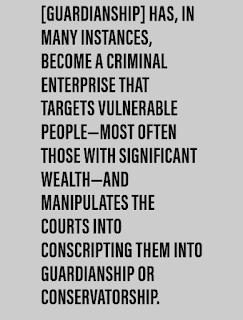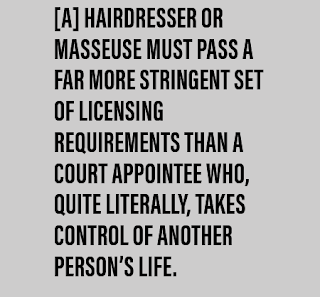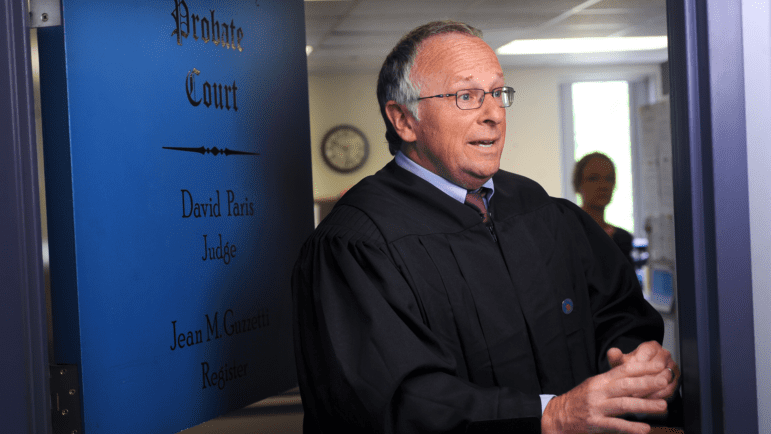Court-appointed guardians have few qualifications, little oversight, and enormous potential for exploitation.
By Diane Dimond
The idea of taking care of family and fellow citizens who cannot physically or mentally support themselves has long been a part of the fabric of American life. But somewhere along the line, that noble notion began to fade. Following World War II, young people in extended families began to move away from rural homes in search of postwar opportunities in big cities. At the same time, many left childhood inner-city areas in search of stylish suburbs. The traditional multigeneration style of living—a daughter and her husband and children living with grandparents, for example— as diminished as the younger folk chose alternatives to staying close to home. Cultural and economic developments during this time, coupled with major advances in medical care, resulted in longer life expectancy, and the number of elders who had been left alone soared. Society then turned to the courts to help these at-risk citizens. That is when the long-established legal process known as guardianship began to morph into something it was never meant to be.
The adult guardianship system we know today was originally established during the early twentieth century. Called conservatorship in some states, it is a court-initiated and court-supervised system that was designed to help the nation’s most vulnerable citizens who cannot care for themselves. Many of these arrangements are made necessary after a family quarrels, sometimes bitterly, over what is best for their at-risk loved one, be they an elderly parent, a sibling with a mental illness, or a relative living with a physical or intellectual disability. When a concerned family member turns to a lawyer for help to settle the dispute, the outcome can be shocking. The client may be led to believe that a judge will name them to the position of guardian, but once in court, reality hits. After hearing about the family’s dispute, the judge might appoint a rival family member to be guardian. But when there is family strife, judges frequently rule that the situation is “dysfunctional” and they appoint a for-profit outsider to be the guardian. The relative who initiated the guardianship might argue against appointing a professional by explaining to the court that only they know the dependent person’s deepest desires and what they had planned for the future. They may inform the judge that their name is specifically mentioned in an existing will, a trust, a power of attorney document or an end-of-life directive. But often none of that matters, because in this astonishing world, the court and its appointees can simply ignore previously prepared legal documents if it is determined that they are no longer in the vulnerable person’s “best interest.” Suddenly, the family member who sought a solution from the court realizes the system has turned on them, and henceforth an outsider will be in charge, a total stranger who makes their living controlling the lives and finances of so-called wards of the court. Welcome to the part of the justice system where the usual criminal and civil rules of procedure simply do not apply.
The criminal justice system is predicated on the idea that a person is “innocent until proven guilty,” but in a guardianship or conservatorship court, that is not the standard. Rulings are based on whether a person is seen as “incapacitated.” Too often there is no presumption that a potential ward has the capacity or is competent to handle their own affairs, for if an attorney brings forth a petition declaring someone to be mentally deficient, judges who hear guardianship cases tend to take their word for it. Frequently and frighteningly, these declarations of mental impairment are not accompanied by any definitive or trustworthy medical findings.
Before an adult is conscripted into this system, a judge must be presented with a “petition for guardianship” and agree that the person in question is incapacitated by either a mental or physical condition and unable to adequately take care of themselves. After that finding, all life decisions automatically transfer to the appointed guardian (defined as someone who manages all health and welfare decisions for another), and/or a conservator (a person who oversees a ward’s finances). Family and friends come to realize that every aspect of the “protected person’s” life will be decided by someone else. Wards are, for all intents and purposes, held captive to the will of another. For some dependent citizens this is a positive step. For too many it is exactly the opposite.
Initiating the guardian or conservatorship process is unbelievably simple. All that need be done is for a lawyer to draw up a petition for guardianship and present it to the proper judge.1 In recent years, attorneys have begun to more frequently insert the word “emergency” in the title of the document. An “emergency petition for guardianship” asserts that the prospective ward is in imminent danger and in immediate need of protection from either self-harm or outside exploitation. In the rush for a ruling (because it’s an emergency!), no time is taken to vet the petition for accuracy. The judge simply takes the word of the officer of the court who filed it. The petition’s allegations about the would-be ward’s situation or their family members’ behavior can be exaggerated, contain mere suspicions, or be outright false. My investigation into the system revealed there is no shortage of attorneys willing to fabricate facts on these petitions. They know busy or uncaring judges will likely just rubber-stamp their request. And due process is routinely nonexistent, especially during hearings on emergency petitions. There is no jury involved. No witnesses are called to refute the petition’s accusations. The targeted person is not even in the courtroom to be seen by or speak to the judge, and family members of the proposed ward often have no idea that a legal proceeding is being held. While these emergency guardianships are temporary, they nearly always become permanent.
Cases involving a nonemergency petition are more cumbersome and take more time to conclude. In those instances, the judge usually orders psychological testing, in-person interviews with both the at-risk person and individuals closest to them. The judge may entertain listening to arguments from lawyers hired by family members opposing the guardianship. There are no reliable statistics on how many of these emergency or nonemergency petitions are rejected by judges, but the number is believed to be small.
Once a person is placed under either type of guardianship—temporary or permanent—their money and material goods are confiscated and they are stripped of their civil rights. Among the many restrictions: they are not allowed to access their money, freely travel, vote, sign a contract, marry or divorce, have a baby, choose where to live, or decide when to go to church, go shopping, or go to a doctor. Many wards find themselves isolated in their own homes or involuntarily moved into assisted-living situations. Currently, there are only a few states that allow guardianized adults to choose their own lawyer; instead, the judge appoints one for them, and the role of that attorney is murky. Are they there to truly represent the ward’s wishes, or are they appointed to decide what is in the “best interest” of the conscripted person? Once in the system, the ward has fewer rights than a prisoner on death row. It has become a shameful, yet tolerated, fact of life in America, and it has gone on for decades.
Perhaps most frightening is the knowledge that a guardianship can target anyone and be initiated by any outside party. The petitioner who starts the process could be a family member, but they could also be a social worker, an angry neighbor, a business rival, a former lover, a real estate agent or antiques dealer who has their eye on your property. In one outrageous case in Rockwall, Texas, a local mechanic claimed an elderly local doctor owed him $40,000 for unpaid work, and he filed an application for guardianship with the court. The judge never laid eyes on the doctor nor alerted his family to the proceeding. There was no hearing or medical evidence presented. Despite this obvious lack of due process, the judge granted the mechanic’s request to become the guardian. The doctor’s family was forced to spend some $100,000 in legal fees for a lengthy fight to undo the mess.
This is no small problem. Best estimates from the National Center for State Courts put the number of adult Americans under active guardianship at 1.5 million, but that does not include those consigned under the banner of conservatorship. And that number is from a 2011 analysis. Informed reform advocates—particularly those who have been ensnared in abusive guardianships and have spent years trying to get corrective state and federal laws passed—believe the correct figure is now closer to two million people. Just what percentage of these wards are subjected to an exploitative guardianship is not known. Reliable and up-to-date statistics are impossible to come by because no organization or state or federal government entity keeps an official tally of those citizens who have been ordered into this system and thereby stripped of the right to make decisions about their own lives. An exhaustive investigation by BuzzFeed News in September 2021 concluded that at the pace the population is aging, there could soon be as many as two hundred thousand new guardianship cases opened in the United States each year. And, of course, for nearly every guardianized person, there are multiple family members and close friends who are also affected by this sometimes-heartless system.
Life under guardianship or conservatorship has changed considerably over the decades. It has, in many instances, become a criminal enterprise that targets vulnerable people—most often those with significant wealth—and manipulates the courts into conscripting them into guardianship or conservatorship. In the process, massive amounts of wards’ assets are put into play. Consider that every year, new guardianships or conservatorships place more than $50 billion under the control of others, and with the average case lasting about six years, that makes for an accumulated $300 billion pot at any given time. This is money that is being controlled by largely unsupervised court appointees. With that much money available, is it any wonder that such a legally sanctioned system would attract the criminal element? Informed critics estimate that predatory players illegally divert multiple billions of dollars from this monstrous cache of money each year.7 Many of those billions have traditionally come from the hard-earned portfolios of older Americans, many of whom scrimped all their lives so they could leave selected heirs a healthy inheritance. Once guardianized, a large part, if not all, of their anticipated bequeathment is diverted to the strangers who operate within this mysterious guardianship system. But today the scandal is much more pervasive as the dishonest have gone far beyond targeting just the elderly. Like other scams, the victim base has grown over time to include young people who have earned or inherited substantial money; injured employees who have won sizable workers’ compensation settlements; victims of birth accidents targeted for control of their hefty medical malpractice awards; those with intellectual or developmental disabilities who receive generous monthly government disability payments; military and government workers with attractive pensions; and citizens with money who suffer from mental illness, even if it is only a temporary handicap (e.g., pop star Britney Spears). Citizens from a wide range of groups have now been unwittingly conscripted into this court-activated alternative existence.
As a journalist trained to present “both sides of a story,” I quickly learned about the veil of secrecy that envelops the guardianship and conservatorship system. Beginning in 2015, and after listening to heartbreaking stories from family members who watched helplessly as strangers took over the lives of their loved ones, my efforts to get the “other side” were almost uniformly stonewalled. In many cases, judges had established wide-ranging gag orders that sealed all court records from public scrutiny and sternly warned participants to stay mum about what had occurred during hearings. Those who refused to remain quiet faced contempt of court charges and substantial fines. For example, a woman in Santa Fe, New Mexico, who tearfully told a girlfriend about her longtime boyfriend’s guardianship case was sanctioned $25,000 after the friend posted about the situation on Facebook. When I requested interviews with lawyers who wrote and presented guardianship petitions, they demurred, citing a standing gag order. After contacting guardians or conservators to ask for comment on specific cases, I quickly learned that transparency is not a hallmark of this system. Even when there was no gag order in place, nearly all insiders shrugged off requests for comment and invoked the idea that since the mental or physical health of the ward was at issue, federal HIPAA privacy laws precluded them from providing any information.
In one of the earliest cases I investigated, family members who had been provided copies of the court docket (schedule of events) and other pertinent legal documents defiantly ignored the judge’s command to stay silent. They courageously passed on their files to me, and I began to write about the indignities and civil rights violations suffered by their guardianized mother.8 Soon, other desperate-to-be-heard individuals contacted me asking that I help expose their guardianship horror stories. These people may have lived thousands of miles apart, but their stories of guardianship exploitation were achingly similar. A nationwide pattern became evident. There were times when I marched myself into court hearings as if I belonged so as to get a firsthand look at how the system operated, only to be promptly removed. I also heard from concerned caretakers, court employees, and those who worked inside corporate guardian offices, who generously provided me with confidential information and paperwork to prove the validity of their stories. Still more anxious relatives of wards sent me shocking photographs of their loved one’s deteriorating condition under guardianship. The photos depicted massive bruises on naked bodies, untreated bed sores, withering limbs, and the blank, sad stares of the overmedicated. I received surreptitiously recorded cell phone videos in which wards tearfully begged to be rescued from their guardian’s control.
Yes, there are always two sides to every story, but in questionable case after questionable case the only response I got from the court-appointed guardianship community was either “no comment,” vague complaints about family dysfunction causing the unfortunate situation, or the rote pronouncement that that the ward was being “protected” in the eyes of the law. My eyes were telling me something different. My brain came to the conclusion that when there is institutionalized secrecy and silence, as has been the central feature of guardianship, meaningful change is unlikely to occur. To my muckraking mind this was an issue crying out for the white-hot glare of public scrutiny.
To be sure, many guardianship arrangements are truly beneficial, especially if a judge names a trusted person to be in control of the at-risk person. In fact, the majority of court-appointed guardians are family members who make sure their loved one is able to live a safe and comfortable life, surrounded by friendly faces who are devoted to their well-being. This is a best-case scenario. Yet, while it might sound ideal—a dependent person enveloped in the bosom of his or her loving clan—this arrangement doesn’t always ensure a positive outcome. The truth is that some family guardians have also been known to take cruel advantage of their guardianized relatives, stealing money or property from them, physically, mentally, and even sexually abusing them. It is rare for a judge to learn of this maltreatment because the conscripted and isolated person has no communication pipeline to reach the court. It is left to other family members to complain to the judge. That said, after following disputed guardianship cases for years now, I can report that many judges refuse to allow family members to speak in court, ordering them to hire a lawyer to address the bench for them. It is not unusual for a judge to dismiss family complaints as coming from the disgruntled, ill informed, or even duplicitous. The personalities in charge of administering this court system tend to be an insular bunch who are routinely dismissive of those who have questions or objections about the way things work.
Over the years, numerous cases have been identified in which a money-driven professional guardian deliberately aligned him or herself with the most disruptive and untrustworthy member of a family. This ensures the family fights will continue. Angry opposing relatives will file multiple complaints with the court about how their conscripted kin’s life is being negatively affected by the guardianship. They may express concern about the way the ward’s money is being spent, the foods or medicines being administered, or the guardian’s sudden declaration that certain relatives can no longer visit because they “upset” the protected person. Each time a complaint is filed, a hearing is called and the guardian must respond to the grievance in court. Time spent preparing for court, or appearing in court, or writing a post-hearing report allows the guardian to charge for more and more billable hours. With an average hourly rate ranging between two hundred to six hundred dollars an hour, it is in the guardian’s financial interest to keep the conflicts brewing. And once a guardian comes under personal attack from the family, they are allowed to hire their own attorney to represent them. They may also ask the court for a psychiatric evaluator to step in to examine the ward or even the person making the complaint. The family may insist that home health aides be dismissed and replaced, or that a certified public accountant (CPA) be hired to examine the way the ward’s finances are being handled. And guess who is responsible for paying the ever-mounting fees for all these outside players? It is the ward, as their confiscated money is used to pay all the bills. When a frustrated family member fights what they see as an unjust system, they may very well be depleting their own inheritance.
It is profoundly important to understand the complete authority that guardians and conservators have. These court appointees can wield enormous power, and they may exercise it almost unchecked. The system was originally designed to help citizens who can no longer live independently, and the overriding standard has always been to assist the ward using “the least restrictive measures,” and with an eye toward “conserving the person’s estate.” 11 But often the first step a professional guardian takes is to put all financial assets under their own name, and then to cocoon their charge away from the outside world. This means the protected person becomes completely dependent on the guardian and the support staff hired on to care for them. Lonely wards have been inaccurately told that their family and friends no longer want to see them; guardians have erroneously told home health aides that a particular relative must be kept away because they have threatened to kill the ward so they can inherit the estate sooner. If family visits are allowed, aides are often directed to hover over the conversation and take copious notes for the guardian’s edification. Guardians have been known to twist the contents of those notes when seeking permission from a judge to ban certain people from visiting. Those stripped of visiting rights are usually the same people who have complained about the guardian’s management techniques. And if the magnitude of this isolation results in anxiety for the ward, a guardian has the power to make sure prescription medications are administered. Overmedicating a ward to ensure compliance is not unusual, and with the elderly it can hasten their death.13 In many states there is no legal obligation for a guardian to stay in touch with the family about the health or ultimate fate of a ward. Guardians have been known to keep a ward’s death secret, order up cremation and keep the cremains in storage rather than pass them to a family member.14 Why would a guardian take such draconian steps? The short answer is because they can, and no authority steps in to stop them. Punishment of court appointees who engage in such inhumane acts has been maddingly rare.
Other examples of egregious guardian behavior have occurred because judges simply assign too many cases to one appointee. For example, a guardian in Florida, with more than four hundred people to keep track of, used her power to initiate Do Not Resuscitate (DNR) orders on time-consuming hospitalized wards. In one instance, her unwanted DNR on a military veteran who had difficulty swallowing was coupled with another order to cap the man’s feeding tube. He died slowly over the course of a week while helpless nurses and doctors stood by. Conversely, there are cases on record in which a guardian ignored a ward’s DNR request, kept the person alive, and thereby insured no interruption of their fees. In Ohio, a guardian assigned to care for hundreds of wards simultaneously parked his charges in nursing homes, ignored them, and then publicly asked for more clients since the nursing home staff was doing his job for him. He ultimately pleaded guilty to multiple counts of stealing from his wards and falsifying court records. A guardian in Nevada was convicted and sent to prison for stealing at least $200,000 and expensive belongings from her wards to help bankroll both her unemployed boyfriend and her gambling habit. The sadistic nature of some guardians is difficult to comprehend.
It is not humanly possible for a judge to adequately monitor the multitude of machinations within each individual case, and the number of wards grows each year. Judges who handle the guardianship and conservatorship caseload routinely complain of being overworked, underfunded, and understaffed. It is easier for them to listen to one voice—that of their own appointee—rather than entertain family members who are almost always painted as being at the crux of the problem. This needs to change. Judges stand as the creators of guardianships. They must be held accountable for what their chosen appointees do. If they need more funding to do the job properly, state legislatures are responsible for making sure that money is available. Adequate funding is ever more urgent as the so-called Silver Tsunami of aging Americans is upon us.
There is an inherent conflict of interest built into this long-neglected system. Guardians are supposed to protect the incapacitated person for as long as they need help, yet there is absolutely no incentive for them to ever report to the court that the ward no longer needs their assistance. To do that would be to deprive themselves of lucrative fees. But a guardianized person who once suffered a brain injury, for instance, can recover and overcome the need for outside intervention. A victim of a debilitating car accident can learn to live an independent life. A person with a physical disability, like cerebral palsy, may need help with transportation or navigating stairs, but that doesn’t mean they lack the mental ability to live their life guardian-free. Sadly, while it is fairly easy to establish a guardianship for citizens like these, it can be next to impossible for them to escape court control.
There are no federal laws specific to guardianships, and state laws are a mishmash. Most states do not require guardians to have a college degree in fields that would enhance their ability to perform their court-ordered duties, subjects like banking or estate planning, psychology or psychiatry, physical or intellectual handicaps, geriatric medicine, social work or family dynamics. Only in recent years have some states begun to require credit and criminal background checks before a guardian can be appointed.19 Surprisingly, many states do not explicitly prohibit chronic debtors or convicted felons from holding such a sensitive position. At this writing, only three states require professional guardians or conservators to be licensed to operate: Alaska, California, and Nevada. In the remaining states, a hairdresser or masseuse must pass a far more stringent set of licensing requirements than a court appointee who, quite literally, takes control of another person’s life.
Some state-level reforms are being adopted to improve the system, but
critics uniformly agree they are Band-Aid solutions that ignore the
bigpicture problems. Many believe the federal government must step in;
the US Congress has held hearings on guardian atrocities dating back to
1987, yet no definitive legislation has ever emerged. That lawmakers
haven’t seriously tackled the obviously systemic problems inherent to
guardianship and conservatorship leaves the public wondering just who is
fighting against improvements—and why.
Full Article & Source:
On the Perils of Adult Guardianship, An Industry Rampant with Fraud and Abuse








.png)









